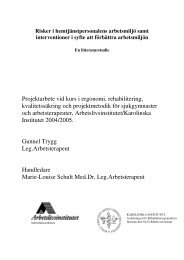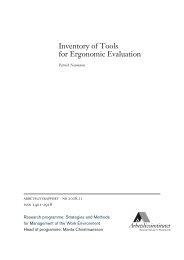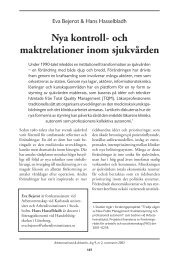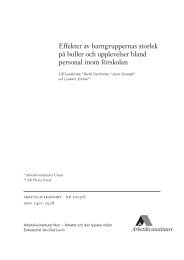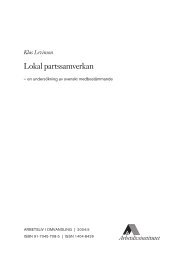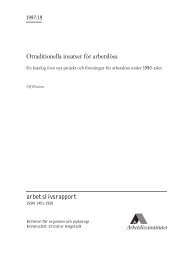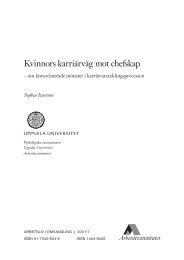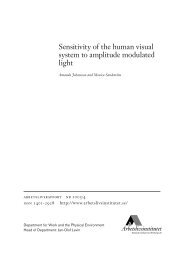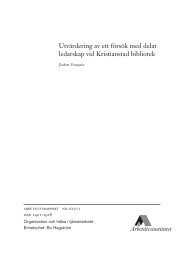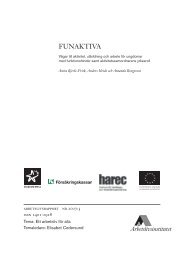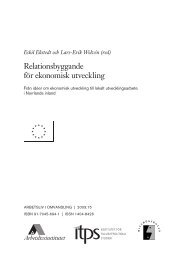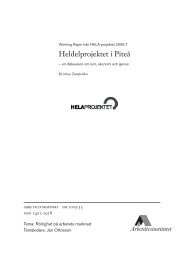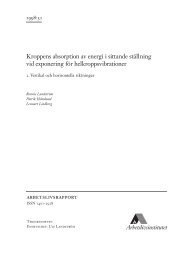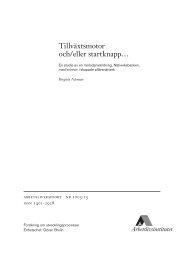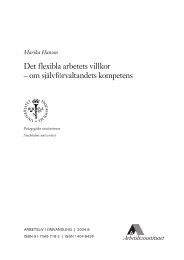Auktoritet och ansvar: Lärares fostrans- och omsorgsarbete i ... - DiVA
Auktoritet och ansvar: Lärares fostrans- och omsorgsarbete i ... - DiVA
Auktoritet och ansvar: Lärares fostrans- och omsorgsarbete i ... - DiVA
You also want an ePaper? Increase the reach of your titles
YUMPU automatically turns print PDFs into web optimized ePapers that Google loves.
lies a problem. (2) A new kind of respect that is “horizontal”, i.e. pupil to pupil<br />
oriented, is emphasized today, as illustrated by the concept of bullying. Even this<br />
discipline problem is based on honesty rather than on lies (3) A psychological<br />
view on behavioural problems make the confession, i.e. the telling of truth, of<br />
less importance, since truth from a psychological perspective does not imply<br />
guilt.<br />
Chapter 5 [“The two wars of the pupil collective”] continues the investigation<br />
of what has been seen as a discipline problem. The relationships between pupils<br />
has sometimes been described as somewhat pathologic. The result of the chapter<br />
is that these perceived pathologies are not constant. In the early part of the 20 th<br />
century, there was a widespread idea that the collective is too “tight”, that the<br />
solidarity of the children make them revolt and protest collectively against the<br />
teacher. In the late part of the 20 th century the concept of bullying and other related<br />
concepts gave a totally different picture of the social relationships between<br />
the pupils, thereby leading to new ideas of the meaning of moral education for<br />
teachers.<br />
In chapter 6 [“The transformations of the school punishment”] punishment in<br />
schools is investigated. In the first half of the century the idea of the fair punishment<br />
had a very firm grip of discussions on punishments. The idea of being fair<br />
was often seen as the criterion for a good punishment and, by implication, a good<br />
teacher. The origins and consequences of the idea of fairness are investigated.<br />
Finally it is argued that the idea of the fair punishment has been weakened, and<br />
this change can be explained by a psychological view on discipline problems and<br />
by the emergence of “secret punishments”. Further, the emergence of “punishing<br />
networks” is dealt with, a tendency that can be seen as a break with the tradition<br />
of the solitary teacher.<br />
Chapter 7 [“Authority”] summarises some of the discussions from the preceding<br />
chapters, from the perspective of authority. The question is discussed as<br />
to whether there has been a change in the role of the teachers with regards to<br />
authority. It is argued that the present situation should not be understood as a<br />
crisis of authority, at least not in the sense that this crisis should be seen as a new<br />
phenomenon. It is also argued that the value of charismatic authority should not<br />
be seen as a new phenomenon. Instead it is argued that qualitative changes in the<br />
way that authority is exercised and experienced are the features of the present<br />
condition. These tendencies are described as an individualisation of discipline<br />
problems; a normalisation of discipline problems; an increased collegiality in<br />
dealing with discipline problems and a “schoolification” of discipline problems.<br />
In chapter 8–11 there is a shift of focus from the disciplining of the normbreaking<br />
child towards the responsibility and care towards the suffering school<br />
child. Changes in the teaching profession are analysed in terms of how the<br />
responsibility for the suffering child has changed. Chapter 8 [Happiness and<br />
suffering today and tomorrow] analyses how the changing conceptions of the<br />
226



